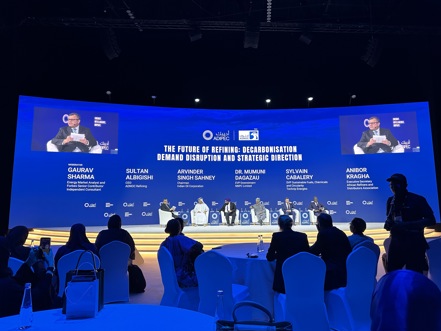Refiners confront twin challenges of demand disruption and decarbonization
J. Watkins, Gulf Energy Information
Leading executives from global refining and energy organizations gathered at ADIPEC 2025 to confront the sector’s dual imperatives: achieving decarbonization targets while adapting to evolving demand dynamics. The panel, moderated by energy analyst Gaurav Sharma, drew on insight from industry leaders representing ADNOC, Indian Oil, NNPC, Technip Energies, and the African Refiners and Distributors Association (ARDA).

Sultan Albigishi, CEO of ADNOC Refining, emphasized the importance of “future-proofing the business” while navigating short-term margin volatility. “We must deliver profitability in the near term while maintaining clarity of purpose in our transition strategies,” he said.
Arvinder Singh Sahney, Chairman of Indian Oil Corporation, outlined a three-pronged approach to decarbonization: improving process efficiency, greening energy inputs through renewable-powered grids, and shifting toward green hydrogen. “We aim to reduce carbon intensity by 60–70% across our refining footprint,” he said, highlighting the integration of petrochemicals as a key lever for margin enhancement.
For Dr. Mumuni Dagazau, EVP of Downstream at NNPC Limited, success hinges on staying in business 20 years from now. “Decarbonization is no longer optional; it’s a license to operate,” he said, citing Nigeria’s push to balance energy security with emissions reductions. “Integration across the value chain—from upstream to retail—gives us a resilience advantage.”
Technip Energies’ SVP Sylvain Cabaley pointed to over 100 refineries globally at risk due to poor energy efficiency and high emissions. “Flexibility and local adaptability are essential. We’re helping clients shift from grey to blue to green through modular carbon capture and hydrogen solutions,” he said.
Anibor Kragha, Executive Secretary of ARDA, stressed that investment in African refining must address regulatory stability, human capital, and regional harmonization. “One in two people born between now and 2040 will be African,” he said. “We need cross-border infrastructure and consistent fuel specifications to attract meaningful capital.”
The panel unanimously agreed that technology will be the enabler of transformation. AI, digitalization, and next-gen carbon capture technologies will help drive cost efficiency and emissions reduction.
As Kragha concluded, “If your dreams don’t scare you, you’re not dreaming big enough. Our goal must be to meet soaring demand with the lowest possible carbon footprint—and we must act now to make that vision a reality.”






Comments